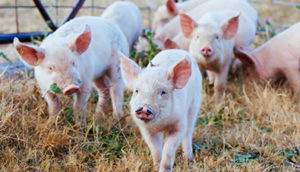Read the latest information on
Foot-and-mouth disease
 Several years on from the arrival of African swine fever (ASF) in Asia, the deadly pig disease remains right on Australia’s doorstep. With the Food and Agriculture Organization of the United Nations issuing a heightened risk alert for the region, Animal Health Australia (AHA) is urging land managers and especially pig owners in Australia to be incredibly disciplined in how they manage their property biosecurity.
Several years on from the arrival of African swine fever (ASF) in Asia, the deadly pig disease remains right on Australia’s doorstep. With the Food and Agriculture Organization of the United Nations issuing a heightened risk alert for the region, Animal Health Australia (AHA) is urging land managers and especially pig owners in Australia to be incredibly disciplined in how they manage their property biosecurity.
ASF first emerged in sub-Saharan Africa in the 1990s, but has spread rapidly across the globe since 2016, now also being found in parts of eastern Europe and Asia. The World Organization for Animal Health has received reports of more than 11,000 outbreaks in Asia since 2018, and more than 3,000 of these are considered ongoing. The emergence of a new variant of the virus coupled with the increased global movement of people and food around the time of the Lunar New Year, has biosecurity authorities worried that ASF may continue to spread, including possibly reaching Australia in illegally imported meat products.
AHA’s Executive Manager, Biosecurity and Animal Health Systems, Dr Simon Humphrys, has a simple message for Australian pig owners: Don’t feed pigs meat or meat products!
“One of the biggest risks of ASF arriving in Australia is in meat from an infected pig, which can spread to domestic or wild pigs when consumed,” Dr Humphrys explained.
“ASF is caused by an incredibly hardy virus which can survive being both frozen and par-cooked. For this reason, we don’t import pork or pork products from countries where the virus is known to be present, but of course there’s no such thing as zero risk.”
ASF is highly infectious, often spreading through whole herds before signs are visible, and kills 80-100% of pigs that it infects. The disease itself and control measures to curb its spread have been responsible for the death of roughly a billion pigs worldwide.
Big-ticket biosecurity risks have always been a focus of customs efforts at Australia’s borders, and while international arrivals are almost non-existent due to the COVID-19 pandemic, mail continues to be a high-risk pathway for products containing the virus to cross the border.
“ASF is just one of a number of viruses which can survive in meat and go on to reinfect pigs, with the other big name being foot-and-mouth disease (FMD),” says Dr Humphrys.
“Both ASF and FMD virus have been found by biosecurity officials in confiscated products at airports and mail centres in recent years, and either would be a multi-billion dollar disaster for Australia’s livestock sectors.”
“Fortunately for people at home, the easiest solution to preventing pigs from becoming infected is simply to ensure pigs aren’t fed meat, or anything that has been in contact with meat.”
While pigs are omnivores (and a great way to reduce food waste!), they live perfectly healthy lives eating fruits, vegetables and grains, supplemented with a purpose-made stock feed. Feeding your pigs meat, or anything that has been in contact with meat (i.e. on the same plate or in the same container), risks making your pigs sick.
Due to the high risk, it is illegal in all states and territories to feed pig meat products or other food that you’d reasonably expect to be contaminated by meat products, or provide these to someone who will be feeding them to a pig, with heavy fines attached.
“If we each do our part to ensure pigs (wild or farmed) are not fed potentially contaminated products, we can help biosecurity officials to keep this disease and others out of the country.”
Find out more about feeding pigs healthy feed via the Farm Biosecurity website.